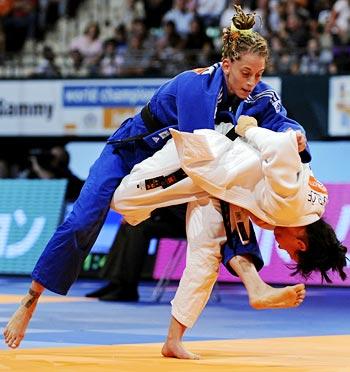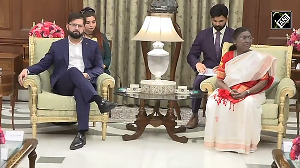 The "Mother of Judo" waited 50 years to get the gold medal that was snatched from her in her first serious competition, a gender injustice that fuelled Rusty Kanokogi's winning crusade for women's judo in the Olympics.
The "Mother of Judo" waited 50 years to get the gold medal that was snatched from her in her first serious competition, a gender injustice that fuelled Rusty Kanokogi's winning crusade for women's judo in the Olympics.
The gruff, plain talking Kanokogi who has received praise and recognition from the government of Japan, the International Judo Federation and International Women's Hall of Fame, was denied the prize at a YMCA tournament for being a woman.
"This should never, never happen to a woman again in sports," Kanokogi said about the rage she felt back in 1959.
"It was a negative for a while but I turned it around into a positive. I started the manoeuvring for the recognition of women's judo and other sports. Basically it was encouragement," the 74-year-old said on the eve of last week's medal ceremony that rectified the wrong half a century later.
"If the medal had not been taken away from me, who knows? Women's judo could still be waiting to get into the Olympics."
The gender-equality fighter who is now battling a rare form of cancer was born Rena Glickman and grew up tough on the streets of Brooklyn's Coney Island when girls were not allowed to play most school sports.
BOYS ONLY
"I was a strong girl, very physically active with no sports in school because that was for boys only," she said.
"So I took pleasure in hitting the heavy bag [punch bag] after school. I had a chip on my shoulder so I started using people in the street as a heavy bag.
"I was getting in trouble. Here I had the physical ability of a strong male with the mentality of a teenage girl. I was kind of lost. I was a lost soul with no place to go."
Kanokogi found herself in judo, intrigued after a friend showed her some moves.
She threw herself into the sport and practised with the young men at the local YMCA when asked by the coach to fill in for an injured boy in a competition at upstate Utica, New York.
Told to try and earn a draw in her match to help the team, the 24-year-old produced a surprise.
"Instinctively, once I took hold of my opponent's judo gee [uniform top] I just went in for the big attack and I threw him," she recalled. "It worked. I got a full point."
Kanokogi said that although it was not in the rules that competitors had to be male, she disguised herself anyway. "I wasn't told to take the ace [stretch] bandage and bind up my boobs," she said. "I did that on my own."
However, the tournament director confronted her afterwards, insisting girls could not compete and saying she would have to give her medal back or her team would be disqualified.
"I took the medal off and handed it to him," she said. "All of the guys wanted to give the medals back and the trophy and I refused to let them do that. We had a solemn ride back to the city."
NO SHRINKING
Kanokogi did not shrink from the episode.
Instead, she worked even harder as a competitor and instructor, travelling to Japan three years later to study the Japanese martial art. There she met future husband Ryohei Kanokogi, a coach for Japan's Olympic team.
She dedicated herself to the sport and the premise that women deserved the right to compete in judo at the Olympics, which men had done since in 1964.
Kanokogi, who married her judo soul-mate in 1965 in a partnership that produced two children, organized the first women's world championships in 1980 at Madison Square Garden, assembling 27 countries to satisfy an Olympic pre-requisite.
"In 1984 at the LA Olympics they once again rejected women's judo from the Games. I went crazy," she said.
Enlisting help from the American Civil Liberties Union and politicians, Kanokogi threatened legal action over sex discrimination and finally broke through when women's judo was staged as a demonstration sport at the 1988 Seoul Games.
Four years later it became a fully-fledged part of the Olympic programme in Barcelona.
"I wanted it not just for United States women but for women round the world to be able to be in the Olympics," said Kanokogi, who last year was awarded the Order of the Rising Sun from Japan, its highest honour for a foreigner.
"What the hell was the problem? It was mentality. Full contact sport for women. The first in Olympic history.
"Could the IOC relate to it? They could think of mommy on a horse but they couldn't think of mommy fighting."
Eileen O'Connor, head of the Brooklyn YMCA, presented Kanokogi a medal in "recognition for a lifetime of inspirational leadership and commitment to equality for women in sports."
The feisty Kanokogi is now fighting a battle for her health. She suffers from multiple myeloma, a cancer that has also led to kidney failure, forcing her on dialysis.
"Through the judo, my spirit is still extremely strong," she said. "I've lost some weight and I need a cane. However, I can use that cane like a Samurai sword. I'm not worried."
Image: Kitty Braviki of the Netherlands (left) fights Sanna Askelof of Norway in the under 52-kg women's elimination during the World Judo Championships in Rotterdam on August 27, 2009
Photograph: Reuters








 © 2025
© 2025